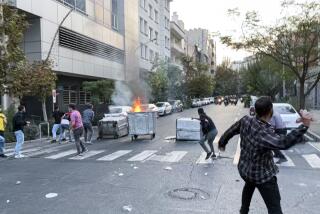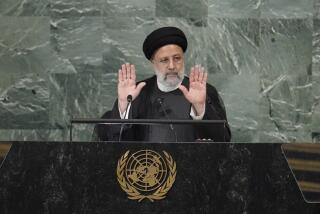Rice Calls on U.N. to Get Tough on Iran
- Share via
SOFIA, Bulgaria — On the eve of a United Nations deadline for Iran to halt uranium enrichment, U.S. Secretary of State Condoleezza Rice on Thursday called for diplomatic action against Tehran, warning that the U.N. Security Council cannot permit the regime to “simply ignore its will and its word.”
Rice, appearing at a NATO meeting, said Iran probably would ignore a deadline set for today by the United Nations watchdog agency for a halt to enrichment. When the International Atomic Energy Agency reports this failure, she said, the council must ask itself whether it will remain credible if it allows Iran to “simply flout the will of the international community” without penalty.
As the most important world security institution, the Security Council “cannot have its will and its word simply ignored by a member state,” she declared.
Iran says it is seeking the ability to enrich uranium to supply its civilian power plants. The Bush administration believes Iran wants to develop nuclear weapons, and it has been trying to build international pressure on the regime as the deadline has approached.
The United States, Britain and France would like a U.N. resolution that would make compliance to the U.N. demands compulsory and could open the way for sanctions.
But countries such as Russia and China have appeared unwilling to accept tougher language, or sanctions against Iran, and top Iranian officials have defiantly declared all week that they will not comply.
Rice sought to enlist more support this week as she met with leaders in Greece and Turkey and, on Thursday, with top officials from the 26-member North Atlantic Treaty Organization. Though the alliance has taken no position on the issue, Rice discussed Iran’s nuclear ambitions with officials of other NATO member nations over dinner.
But there have been signs all week that many countries are not fully convinced, and some fear that if diplomacy fails, the Bush administration will turn to military action, as it did three years ago in the case of Iraq.
Earlier in the week, Greek and Turkish officials told Rice that they were worried that the U.S. would be asking for use of their territory or other help in military action against Tehran. On Thursday, Rice sought to allay similar concerns that the Bush administration might cite a just-completed defense accord with Bulgaria to justify using military bases here for an attack on Iran.
“Let me go right to the heart of this question, because I know this is on people’s minds,” Rice said at a news conference. Although President Bush “doesn’t take any of his options off the table,” she said, referring to military action, “we are committed to a diplomatic course” to bring enough pressure on Iran to compel it to give up its nuclear weapons ambitions.
The agreement with Bulgaria, which is to be signed today, will allow the U.S. military to have as many as 2,500 troops at a time on Bulgarian soil. On Thursday, a Bulgarian national party called Attack organized a rally against the deal, drawing several thousand protesters in Sofia, the capital.
The demonstrators waved banners that read, “Condi, ask the Bulgarian people,” and “U.S. bases war.” Rice’s visits in Athens and Ankara, Turkey’s capital, also drew protesters.
Meanwhile, an Iranian exile group claimed that Tehran was working at secret military sites to develop a type of centrifuge machine that would enable it to make fuel for an atom bomb faster than current estimates.
The National Council of Resistance of Iran, which has reported accurately on hidden Iranian nuclear sites in the past, told Reuters news service that Tehran was researching “P-2” centrifuges in secret areas of its Natanz enrichment plant and the Ab-Ali site near Tehran. The group, which is on a U.S. list of terrorist groups, said both areas were linked to Iran’s Defense Ministry. Tehran says its nuclear program is only for generating electricity and has no links to the military.
More to Read
Sign up for Essential California
The most important California stories and recommendations in your inbox every morning.
You may occasionally receive promotional content from the Los Angeles Times.














